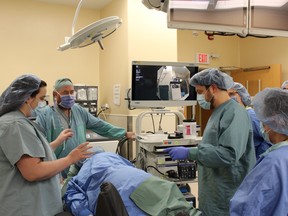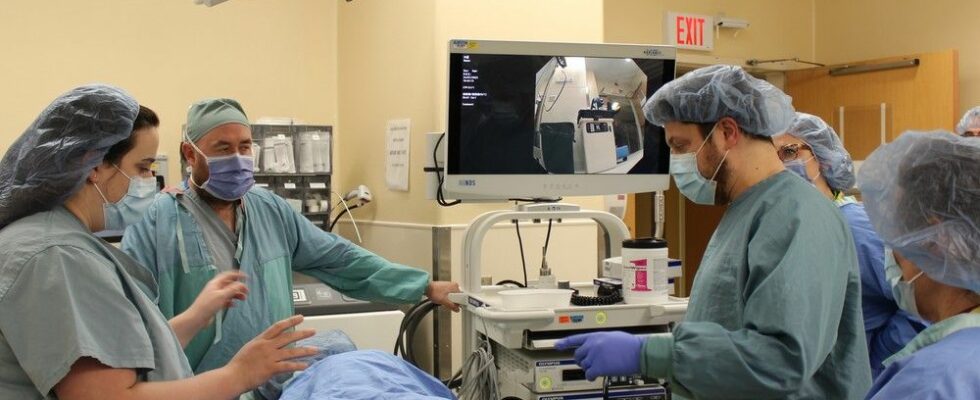About 150 patients per year typically travel outside Sarnia-Lambton for a procedure that helps treat things like gallstones and pancreatitis, Bluewater Health’s top doctor says.

About 150 patients per year typically travel outside Sarnia-Lambton for a procedure to help treat conditions like gallstones and pancreatitis, Bluewater Health’s top doctor says.
Now, they have care closer to home, chief of staff Dr. Michel Haddad said.
Known as endoscopic retrograde cholangiopancreatography (ERCP), the procedure that uses a combination of X-ray and endoscopy, including a specialized scope equipped with the ability to grasp and remove stones or insert stents, started earlier this month, Haddad said.
“The equipment also needs someone who knows what they’re doing to use it,” he said.
General surgeon and specialist Dr. Colin Way – that someone – started in January, he added.
Without treatment, blockages of a bile duct in the duodenum can lead to infection, sepsis or multi-organ failure, Haddad said.
Before, patients would sometimes wait days or a week to get the procedure in London.
“Now we do our best to get them done faster,” he said.
Six procedures have been completed so far with the $130,000 equipment, funded from the hospital group’s surgical program budget, officials said.
Treatment also includes antibiotics, but the obstruction first needs to be removed, Haddad said.
“It’s like having a car crash on the highway,” he said. “Eventually you have to open the highway. You have to clear the collision. That’s what this equipment provides us.”
It’s the latest in a long line of changes to make more high-quality services available at Bluewater Health and limit the number of patient transfers, said Haddad, who started at Bluewater Health in 2010.
Among those new services have been bringing in epidurals for expectant mothers; providing better dialysis care; opening an acute stroke assessment centre, a cardiac clinic, an eating disorders clinic, Ryan’s House and other initiatives for mental health and substance dependency; hiring more cardiologists, cancer care specialists, neurologists and geriatric care specialists while forming programs for those specialties; and, now, ERCP, he said.
“Certain services we just don’t have and probably would be very difficult to have” because there aren’t enough cases locally, he said.
“Such as transplants. We’re not going to do that here, or brain surgery or open heart surgery.”
But the cumulative changes mean fewer than two per cent of all inpatients at the nearly 300-bed hospital have to be transferred to other facilities per year, he said.
“We are doing our best to basically punch above our weight,” Haddad said. “Every time we hear of a need in an area, we do our best to provide the service locally.”
Other focuses include attracting more psychiatry and pediatric personnel, an area where there’s currently a shortage, he said.
Recent professional staff additions include two anesthesiologists, a new orthopedic surgeon, a second neurologist who started in January, and the recent signing of a third cancer specialist who’s starting in November, which will help cancer clinic wait times, Haddad said.
He thanked community members for support and patience.
“These things take planning, take years of work,” he said.

Comments
Postmedia is committed to maintaining a lively but civil forum for discussion and encourages all readers to share their views on our articles. Comments may take up to an hour for moderation before appearing on the site. We ask you to keep your comments relevant and respectful. We have enabled email notifications—you will now receive an email if you receive a reply to your comment, there is an update to a comment thread you follow or if a user you follow comments. Visit our Community Guidelines for more information and details on how to adjust your email settings.
Join the Conversation